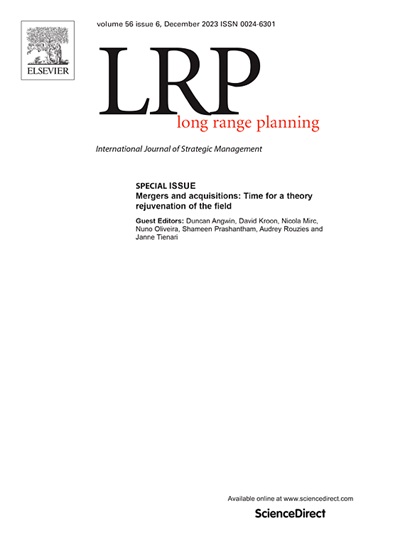在继续出口的同时接受对外直接投资?家族企业异质性与脆弱性的影响
IF 6.3
2区 管理学
Q1 BUSINESS
引用次数: 0
摘要
什么因素促使家族企业改变其国际化战略?本研究认为,管理类型(家族与非家族)以及环境中的内部和外部脆弱性显著影响家族企业在继续出口的同时如何接受对外直接投资(OFDI)。利用混合赌博的视角,并利用来自印度的上市家族企业样本(n = 278),本研究发现,与非家族或专业管理的企业相比,家族管理的企业在保持其持续出口的同时,更不可能接受对外直接投资。结果进一步表明,当家族企业经历内部脆弱性(绩效低于期望)和外部脆弱性(外国竞争)时,采用对外直接投资的可能性增加。本研究最后讨论了研究结果的理论和管理意义,并强调了未来研究的丰富途径。本文章由计算机程序翻译,如有差异,请以英文原文为准。
Embracing outward FDI while continuing exports? The impact of heterogeneity and vulnerability in family firms
What factors prompt family firms to undertake change in their internationalization strategy? This study argues that type of management (family vs. nonfamily) and internal and external vulnerabilities in the environment significantly impact how family firms embrace outward FDI (OFDI) while continuing exports. Drawing on the mixed gamble perspective and utilizing a sample of listed family firms from India (n = 278), this study finds that family-managed firms, as compared to nonfamily or professionally managed firms, are less likely to embrace OFDI while maintaining their ongoing exports. Results further demonstrate that the likelihood of family-managed firms’ adoption of OFDI increases when they experience internal vulnerability (performance below aspirations) as well as external vulnerability (foreign competition). This study concludes by discussing the theoretical and managerial implications of the findings and highlighting fertile avenues of future research.
求助全文
通过发布文献求助,成功后即可免费获取论文全文。
去求助
来源期刊

Long Range Planning
Multiple-
CiteScore
13.00
自引率
7.10%
发文量
75
期刊介绍:
Long Range Planning (LRP) is an internationally renowned journal specializing in the field of strategic management. Since its establishment in 1968, the journal has consistently published original research, garnering a strong reputation among academics. LRP actively encourages the submission of articles that involve empirical research and theoretical perspectives, including studies that provide critical assessments and analysis of the current state of knowledge in crucial strategic areas. The primary user base of LRP primarily comprises individuals from academic backgrounds, with the journal playing a dual role within this community. Firstly, it serves as a platform for the dissemination of research findings among academic researchers. Secondly, it serves as a channel for the transmission of ideas that can be effectively utilized in educational settings. The articles published in LRP cater to a diverse audience, including practicing managers and students in professional programs. While some articles may focus on practical applications, others may primarily target academic researchers. LRP adopts an inclusive approach to empirical research, accepting studies that draw on various methodologies such as primary survey data, archival data, case studies, and recognized approaches to data collection.
 求助内容:
求助内容: 应助结果提醒方式:
应助结果提醒方式:


